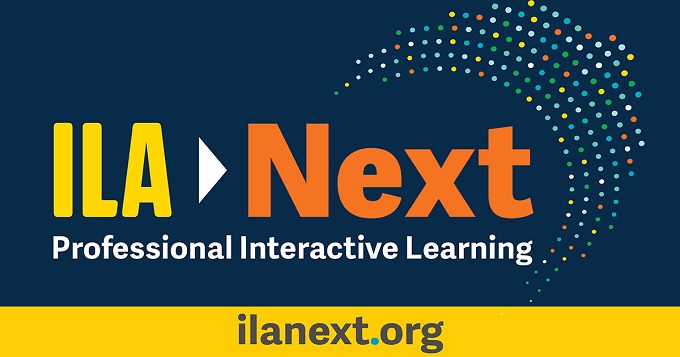 If there’s anything we’ve learned this year about remote instruction, it’s that learning opportunities designed with intention—particularly with equity and empathy in mind—are more critical now than ever before.
If there’s anything we’ve learned this year about remote instruction, it’s that learning opportunities designed with intention—particularly with equity and empathy in mind—are more critical now than ever before.
As Nancy Frey said during her ILA Next Main Stage Session with Douglas Fisher: “It’s not the platform itself, but rather it’s what we do within that platform.”
This idea has been a common thread among presenters throughout ILA Next, a monthlong learning event designed to meet the needs of educators and students in our virtual and hybrid environments.
Building upon this theme, several speakers have also pointed to the need to reimagine education as a whole. Like the book title of Main Stage Session speaker Yong Zhao states: An Education Crisis Is a Terrible Thing to Waste.
The following are just some of the messages shared during Week 2 about how we can rethink our teaching, maximize our impact, and maybe even change the concept of schooling altogether.
Embrace mistakes
An inevitable teacher moment in distance learning is making a mistake on a recorded video. Resist the temptation to rerecord, urged Fisher.
“I would like to argue for three reasons not to do that,” he said. “No. 1:You don’t have time…No. 2: I think it sets up this false expectation that we have to be perfect every time. And No. 3: We rob the students modeling opportunities for self-correction. We need to normalize mistakes.”
If we can show that, he said, students might just take a risk.
Prioritize self-care
Social-emotional learning and trauma-informed pedagogy are at the forefront of our practices—but don’t forget about caring for your own needs. Main Stage speaker Cornelius Minor referred to it as rationing.
Educators strive to give 100% each day, but now is the time to give yourself a mental break and understand that it’s OK to give 100% on one day and then maybe 70% or 80% on the other days.
“I want to acknowledge that this is not irresponsible or lazy. Rather, rationing…is what responsible people do in extreme situations,” Minor said. “I am choosing how I invest my energy and my time across my week, understanding that I cannot do everything. Giving 100% is going to fatigue me. And no kid, no community, needs a fatigued educator.”
Fisher compared it to the phrase about putting your own oxygen mask on first.
“You cannot fill the cup of another person if yours is already empty,” he continued. “You’re worth it. We need you. Don’t burn out. Please take care of yourself.”
Intermediate Pathway Workshop presenter Lori Oczkus also took time to touch on self-care, quoting aphorist Mason Cooley: “Reading gives us a place to go when we have to stay where we are.”
“That’s a great quote right now since we can’t go many places,” Oczkus mused, adding that the mental and physical benefits of reading are plentiful—for teachers and students alike.
Connect with students
Several presenters have focused on the importance of students taking the lead, even in distance learning. In Kenneth Kunz and Kia Brown-Dudley’s Primary Pathway Workshop, they discussed the power in storytelling and classroom conversations as both a window into the teacher’s world and a window into the students’ world.
Brown-Dudley used the analogy of a volleyball game to illustrate how to practice classroom conversations. “I like to think of conversations as being more like a volleyball match than a tennis match,” she said. “When you play tennis, you hit the ball over the net, the person hits it back to you…But with volleyball, you hit the ball over the net and that ball or idea is passed around to other members on the team before it goes back over the net.”
She added: “It’s really important that we’re hearing all voices, that we’re encouraging all of our students to speak.”
“This storytelling for me, it just provides such a powerful way of connecting with students and building relationships, even in the virtual environment,” Kunz said.
Return to better
Minor declared that the path forward must be defined by individual teachers, school cultures, and pedagogies that grapple with the question: What if we didn’t return to normal? What if we returned to better?
“This current pandemic and the shift to remote or hybrid or socially distanced learning has revealed what so many educators representing historically marginalized groups have been articulating for years, and that is the reality that there are profound inequities in schooling,” he said.
Although there is no “one best way” forward, essential components include self-work, systemic awareness, active changemaking, and powerful teaching.
Rethink schooling
Main Stage speaker Zhao said COVID-19 presents the time to rethink the “what, how, and where of learning” in profound ways.
Reforms of the past have focused on policy and pedagogy, he said, but not on the actual learning environment in ways that will encourage students to become owners of their learning.
“We need to have students be responsible for their own learning and you, we all, [must] work to create that space,” he said. “Let’s not think about the curriculum. Let’s think about the child…Let’s not think about how to teach. Let’s think about how to support learning.”
To accomplish this, this time of crisis can be “smartly used to invite innovations and big changes.”
Chief among them—learning pathways for students, which should be created with them, not for them.
“Children are the creators of the future,” Zhao said. “I don’t like it when schools and systems say, ‘We will get our children ready for the future.’ There is no future. The future is made by our children. We prepare them to participate, to create a better future for all of us.”
Colleen Patrice Clark is the managing editor of Literacy Today, ILA’s member magazine.